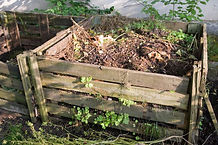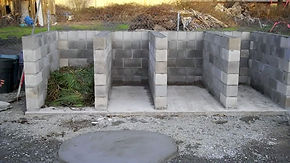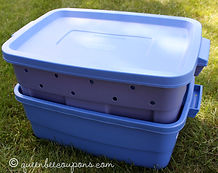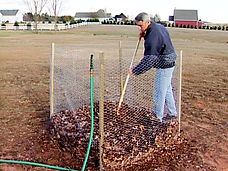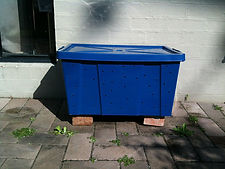
Where to find it?
Wooden Pallets and Reclaimed Wood
-
Various places either give away or sell wooden shipping pallets. If ever you see some piled up outside of a building it can never hurt to ask an employee if they are for the taking. Some consistent places include:
-
United States Electric Company (217) 522- 3347, www.gscc.org
-
CopperTree (217) 793-0900 www.coppertreedesigns.com
Chicken Wire
-
Any local farm supply store or hardware company should have this item in stock.
-
Check online forums such as Craigslist and Givingaway.
-
Habitat for Humanity ReStore
(217) 523-2710 www.habitatsangamon.com
Plastic Barrels
-
Check with local car-wash companies
Cinder Blocks
-
Any local farm supply store or hardware company should have this item in stock.
-
Check online forums such as Craigslist and Givingaway.
-
Check with your local concrete businesses.
Worms
-
After a rainfall, head out into your yard to look for nightcrawlers! Use an old bucket to collect worms and then dump them on your compost.
Compost Bins
There are many different types of compost bins available, including tumblers, bins, and kitchen composters which suit numerous different situations. Choosing the right bin for your composting needs doesn't need to be confusing though. Take stock of the space and materials you have available and check out the listings below for some great ideas.
Learn More and Get Ideas!
Tumblers: A basic tumbler style is shaped like a canister that you roll around the yard. Other styles include a large drum that rests on its aboveground stand with a hand crank to turn it, and smaller units that you grasp and spin as they rest on slightly concave pads on the ground.
One problem with tumblers is that fresh, moist materials occasionally clump into a compacted, heavy ball. How easily you can turn the unit depends upon its style and weight, how much and what type of organic matter it's filled with, and any physical limitations you may have.
A tumbler's enclosed sides foil pests from rooting through the organic matter for kitchen scraps.
Open bins: Examples of open bins include homemade square bins made of shipping pallets or chicken wire. Although they are easy and inexpensive to build, your material can dry out faster or become too wet, depending on climate.
Wood and Chicken Wire Compost Bin
Closed bins: Closed bins are sealed from the elements. Homemade wooden bins with hinged tops serve as an example. Plastic containers with lids also fall under this category. Many manufactured options are available.
Stationary bins: These bins sit in one place for the duration, unless you exert time and effort to relocate them. Examples include a bin made of concrete blocks or a wooden three-bin unit.
Movable composters: Movable bins are nice if you have just one container and want to turn your compost regularly to aerate or remoisten it. Lift the container off the pile, set it aside, and fork or shovel the organic matter back in. Examples of easy-to-move containers include a homemade wire enclosure, a lightweight plastic model without a bottom, and a manufactured wire bin with collapsible sides.
Multi-bin systems: As you gain experience, you can easily add second and third bins. This can provide you with a steady supply of organic matter for your gardens because different bins are at different points in the composting process.
Vermicomposting: If you live in an apartment or condo with zero access to outdoor space for composting, consider harboring a bin of worms to chow down on your food waste. Called vermicomposting, this method is fascinating and effective.
Composting Solutions for the Kitchen:
You may find it convenient to stockpile kitchen scraps destined for your outdoor bin in a small countertop container within handy reach of food prep areas. These units hold about a gallon of scraps.
You can also toss scraps into a plastic food storage container with a tight lid and store it in the freezer to forestall any odors and flies. Transfer it to your outdoor compost operation when convenient. Rinse the container outdoors and pour the water on the compost pile contents.
You can rub lemon juice, vinegar, or baking soda inside kitchen scrap collection containers to remove odors naturally.

